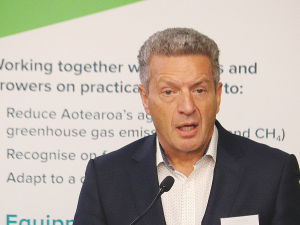DairyNZ chair wants cross-party deal
New DairyNZ chair Tracy Brown says bipartisan agreement among political parties on emissions pricing and freshwater regulations would greatly help farmers.
 Michael Ahie says the farm-level system will enable each farmer and grower to clearly see the direct impact of their on-farm decisions.
Michael Ahie says the farm-level system will enable each farmer and grower to clearly see the direct impact of their on-farm decisions.
He Waka Eke Noa (HWEN) chair Michael Ahie says the approach put forward by the primary sector climate change action partnership in its report to the Government on how to deal with on-farm emissions is the best option.
Ahie told Rural News that it's important to remember that NZ has a biological economy and that the ETS is not the answer to dealing with agricultural emissions.
"There is seriously good science behind the recommendations," he says. "To the critics I say - what is the alternative? If you can come up with one that is going to be better for NZ, let me know."
Ahie says the farm-level system will enable each farmer and grower to clearly see the direct impact of their on-farm decisions. He adds that it gives them incentives for using new technologies and practices as they become available and financial recognition of on-farm carbon sequestration. He concedes that the cost impact will vary from farm to farm.
Ahie believes the HWEN recommendations enable sustainable food and fibre production for future generations, while playing a fair part in metting the country's climate commitments, and is the simplest, best system. He hopes politicials will support it.
Meanwhile, B+LNZ - which says it is supportive of the HWEN proposal - has concerns about the pricing mechanism being proposed.
Chair Andrew Morrison says it wants to be sure that what is being asked of sheep and beef farmers is "fair and equitable".
An information sheet put out by B+LNZ states that there is a need for a cautious approach in regard to pricing and says, "B+LNZ's more detailed additional modelling indicates that the He Waka Eke Noa modelling underestimated the impacts on sheep and beef farm systems' profitability and therefore the emissions reductions likely to occur at the prices modelled by the programme.
"This is because using an average farm does not reflect the significant diversity across and within our farming systems."
It further adds, "There's no doubt that emissions' pricing is confronting for many farmers and for some could significantly affect profitability. Through HWEN we're focused on minimising costs while supporting farmers to play their fair part in measuring, managing and reducing emissions".
HWEN's proposal is now in the hands of the Government, which has until the end of the year to decide whether to accept, reject or modify the recommendations.
New Zealand's new Special Agricultural Trade Envoy, Horowhenua dairy farmer, company director and former Minister of Agriculture, Nathan Guy says the Free Trade Agreement (FTA) with India is a good deal for the country.
New figures show dairy farmers are not only holding on to their international workforce, but are also supporting those staff to step into higher-skilled roles on farm.
New tractor deliveries for 2025 jumped 10% compared to the previous year, a reflection of the positive primary sector outlook, according to the Tractor and Machinery Association (TAMA).
Entries have opened for two awards in the New Zealand Dairy Industry Awards (NZDIA) programme, aimed at helping young farmers progress to farm ownership.
Federated Farmers has confirmed interim chief executive Mike Siermans to the role.
Registrations are now open for the 2026 Ruralco Golf Classic, with all proceeds from the event set to support the Mid Canterbury Rural Support Trust.